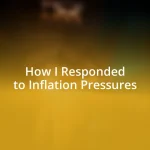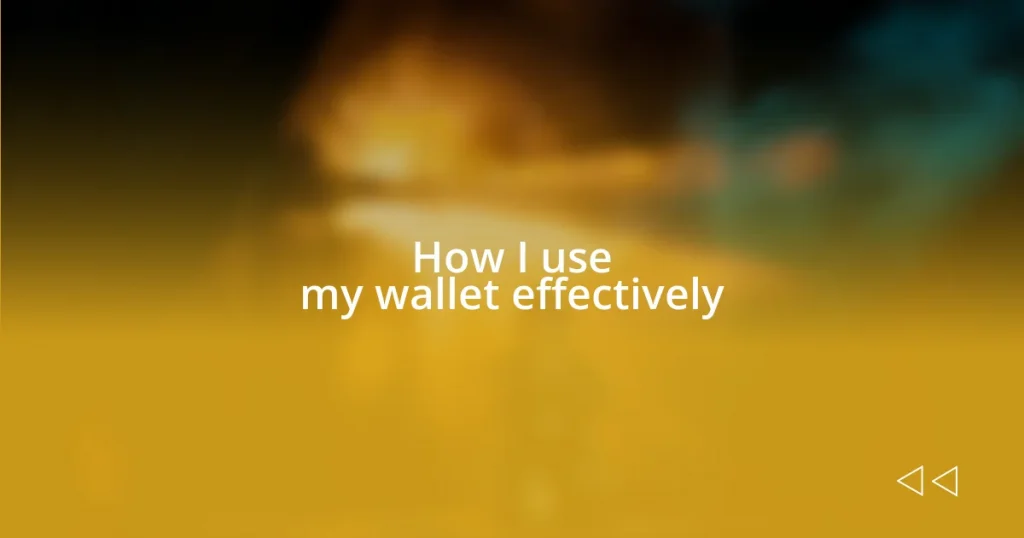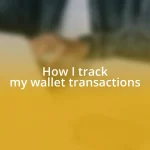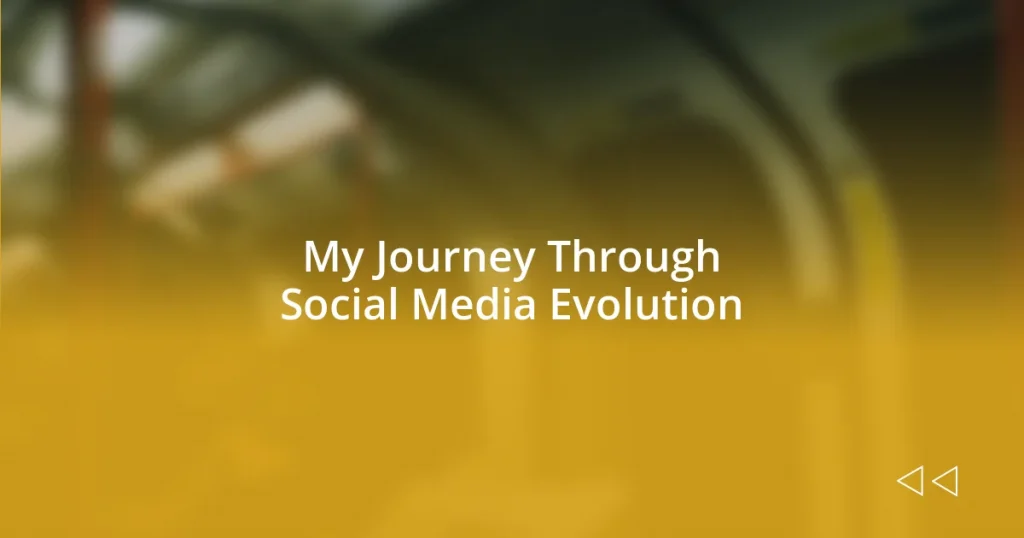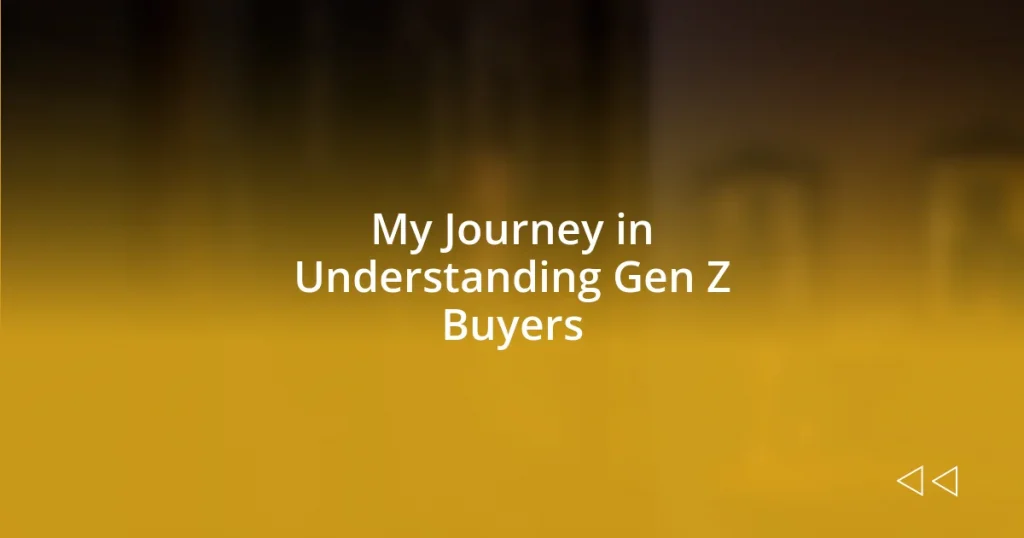Key takeaways:
- Choosing the right wallet type enhances financial management, balancing security, functionality, and personal style.
- Effective organization of cash and cards—by frequency and denomination—improves access and budgeting efficiency.
- Regular wallet maintenance, including decluttering and protecting against damage, extends lifespan and minimizes stress during use.
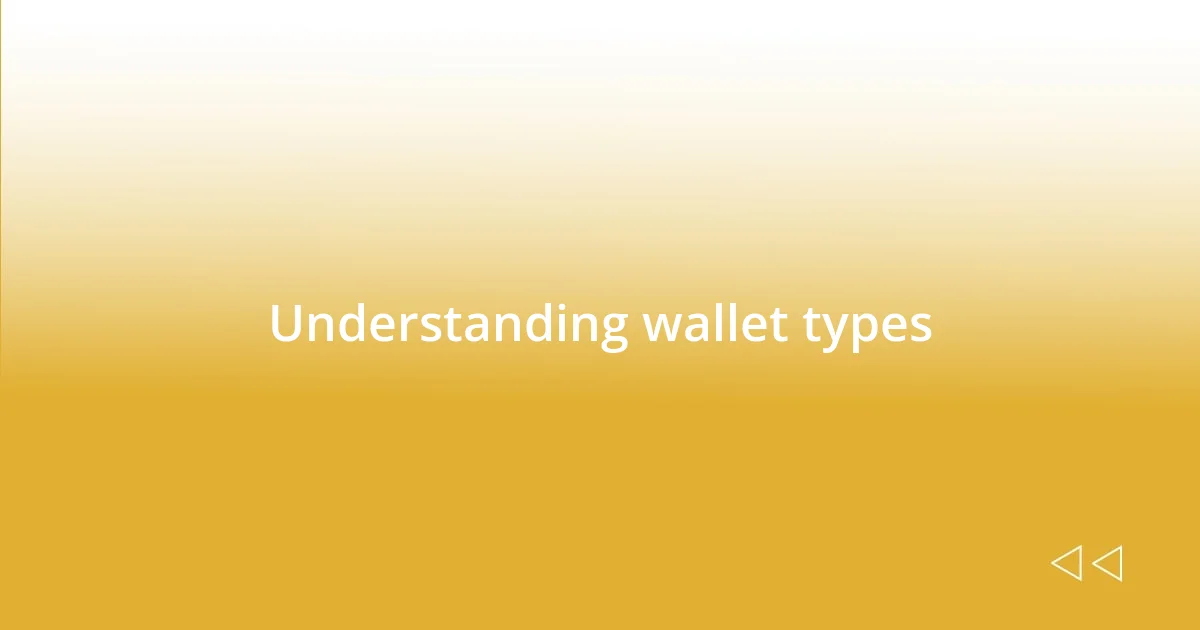
Understanding wallet types
When it comes to wallets, I’ve learned that choosing the right type can significantly impact how well I manage my essentials. From minimalist designs that offer only the basics to bulky options filled with memories and receipts, each type tells a story about how I interact with my finances. Have you ever found yourself rifling through a bulky wallet filled with unnecessary cards instead of enjoying a night out? It’s moments like those that made me rethink my wallet strategy.
As I navigated through different wallet types, I developed a soft spot for the RFID-blocking styles. Initially, I was hesitant about the need for extra security; it seemed excessive. However, a friend’s cautionary tale about identity theft opened my eyes. I can still remember that wave of anxiety I felt, thinking about how easily it could happen. Since then, I’ve embraced wallets that not only look good but also provide peace of mind.
Some days, I opt for a sleek, cardholder-style wallet that fits in my front pocket, making quick transactions seamless. On busier days, I might switch to a more functional travel wallet that accommodates my passport and boarding passes. It’s fascinating how my needs change depending on my schedule. Have you noticed how your wallet choice influences your daily flow? I find that when I’m equipped with the right wallet, it enhances my ability to navigate life smoothly.
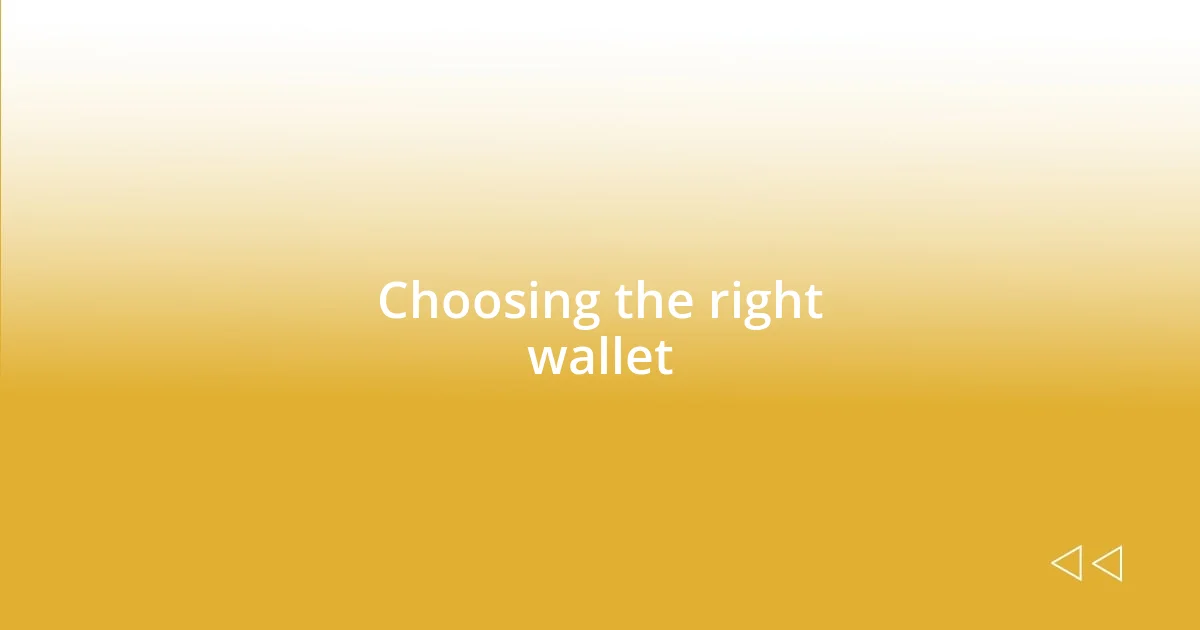
Choosing the right wallet
Choosing the right wallet has become a personal journey for me, revealing how our choices can reflect our lifestyles. I remember the frustration of trying to find my subway card in a cluttered wallet, battling with an avalanche of receipts and old loyalty cards. That experience taught me the value of selecting a wallet that fits my daily rhythm—one that streamlines my essentials while keeping clutter at bay.
When deciding on a wallet, I consider several key factors:
– Size: Does it fit comfortably in my pocket or bag?
– Material: Leather adds a touch of elegance, but I also love durable fabric options for casual days.
– Functionality: Does it provide space for cards, cash, and other essentials without feeling bulky?
– Security Features: Are there RFID-blocking capabilities to protect against digital theft?
– Aesthetic Appeal: I want something that matches my personal style and can transition from day to night seamlessly.
By focusing on these aspects, I’ve found a wallet that not only meets my practical needs but also resonates with my personality, making each use a small pleasure in my day.
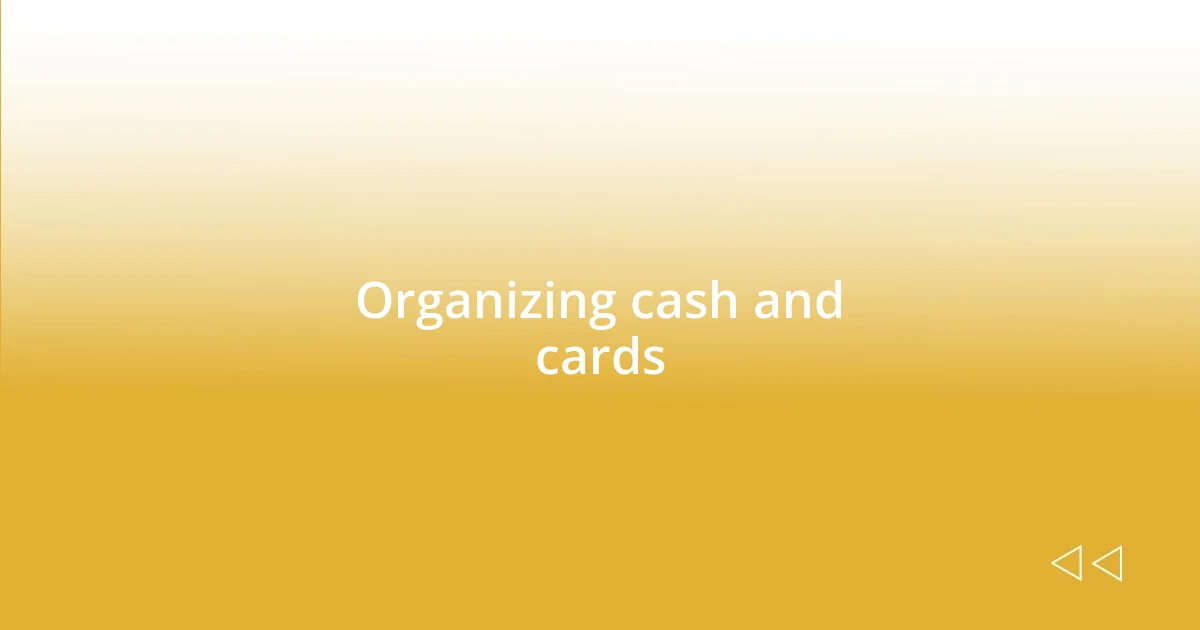
Organizing cash and cards
Organizing cash and cards has been a game changer for me. I used to store everything haphazardly, which often led to panic when I needed a specific card. Now, I’ve developed a system where I arrange my cards by frequency of use. My go-to cards are in easy reach, while less frequently needed ones are tucked away. It’s a simple tweak, but it makes my daily life much smoother. Don’t you find that knowing exactly where your essentials are saves you precious time?
When it comes to cash, I prefer to keep it minimal. I usually organize bills by denomination, which might sound tedious but trust me, it pays off. At restaurants or shops, I never fumble around trying to find the right amount. Plus, it adds a sense of control to my finances. I can easily see how much I have at a glance, which helps me budget more effectively. Have you ever tried organizing your cash? It’s surprisingly liberating.
I also keep a small, textured pocket inside my wallet for coins. This tiny adjustment prevents the frustrating clinking and clanking that often comes from mixed change jangling around. I can securely store only what I need, and it’s made things easier, especially when I’m in a rush. The joy of knowing where everything is truly enhances my wallet experience. How do you handle the small change that usually weighs you down?
| Organizing Method | Benefit |
|---|---|
| By Frequency of Use | Quick access to essential cards |
| By Denomination for Cash | Efficient payments and better budgeting |
| Dedicated Coin Pocket | Reduces noise and prevents clutter |
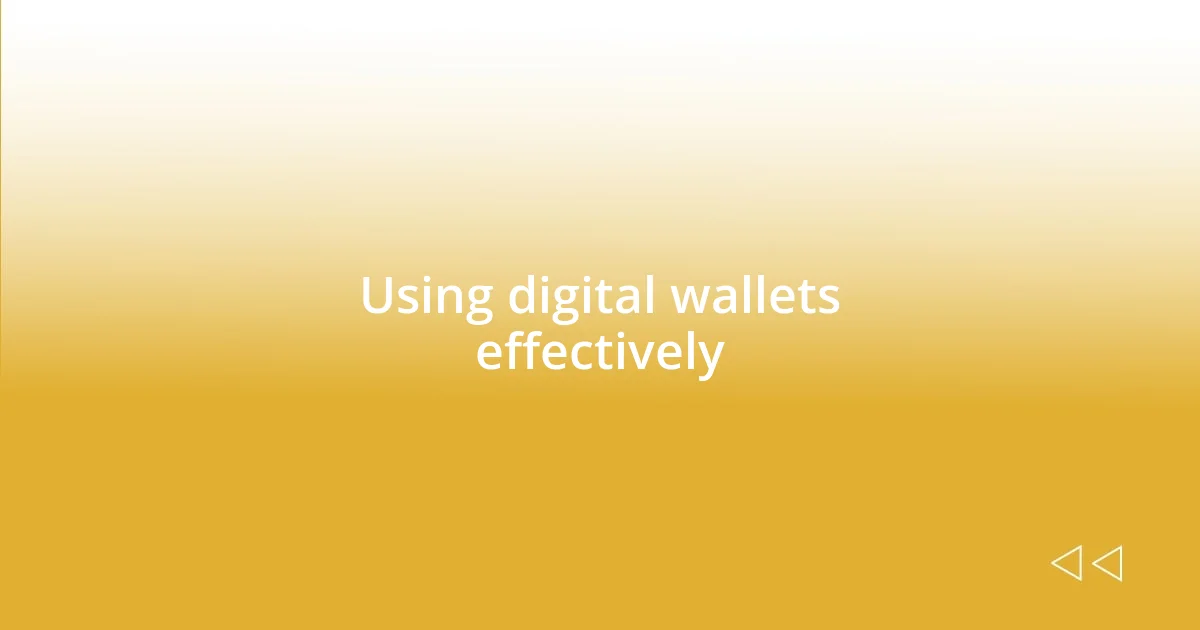
Using digital wallets effectively
Using digital wallets has transformed the way I manage my finances. I vividly remember my first experience with a mobile payment app—I felt a mix of excitement and apprehension, unsure if I could really trust my phone to handle my money. However, once I got the hang of it, I discovered the unparalleled convenience of paying with a simple tap. Have you ever felt that exhilarating freedom of leaving your wallet at home and knowing you can still complete every transaction you need?
I’ve also learned to take advantage of the security features digital wallets offer. For instance, I always enable biometric authentication, like fingerprint or facial recognition. It provides me with peace of mind, knowing that even if I lose my phone, my information remains safe. What about you? Do you prioritize your digital safety when using online payment methods?
And let’s not forget the organization aspect of digital wallets! I often categorize my cards into different folders for easier access. For example, I keep my grocery store memberships grouped, which makes it a breeze during checkout. That little change saves me time and reduces the chaos of scrolling through a long list of cards. Doesn’t it feel great to have everything neatly arranged at your fingertips?
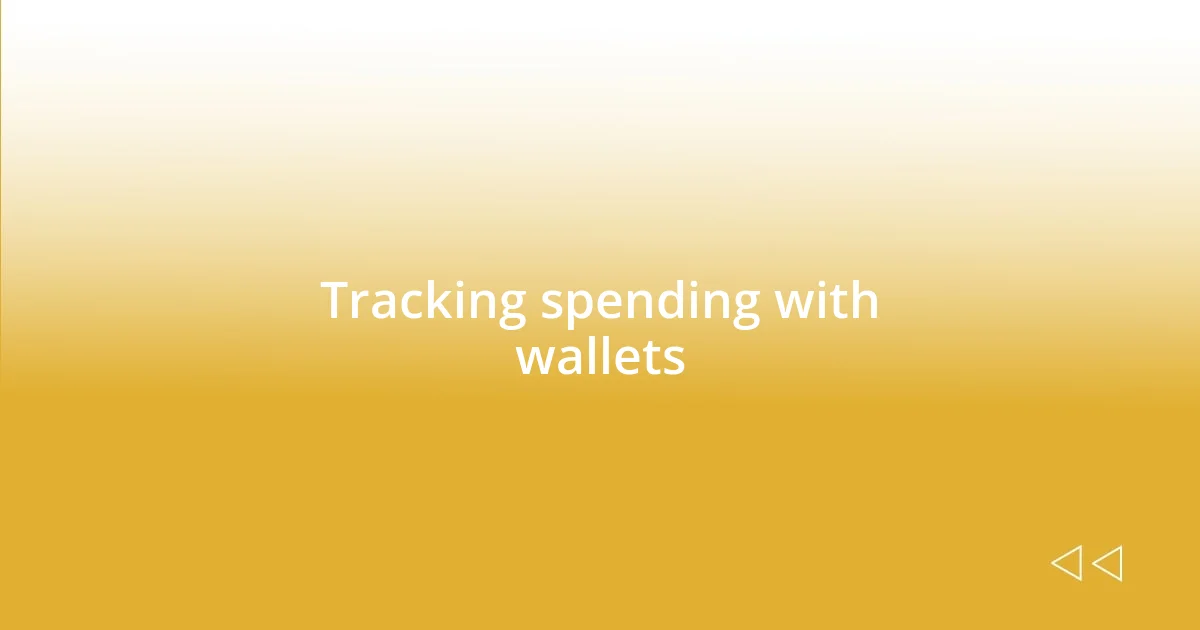
Tracking spending with wallets
Tracking spending is a crucial part of managing my wallet effectively. I’ve started using a simple paper ledger that I keep tucked in my wallet. At the end of each day, I jot down my purchases—it’s a quick check-in that helps me see exactly where my money is going. Have you ever noticed how writing things down gives you a clearer picture of your spending habits?
Additionally, I’ve embraced various mobile apps that sync with my bank account. It feels almost liberating to categorize my expenses automatically. I used to dread monthly budgeting sessions, but now, seeing those pie charts break down my spending makes it a lot more approachable. Do you have a strategy that helps transform the numbers into something you can understand at a glance?
Finally, I’ve found that tracking spending also helps me identify unnecessary expenses. Once, I realized I was spending too much on coffee runs after seeing it highlighted in my app. I decided to allocate that money toward a hobby I love instead. Isn’t it fascinating how just a little bit of awareness can reshape your financial priorities?
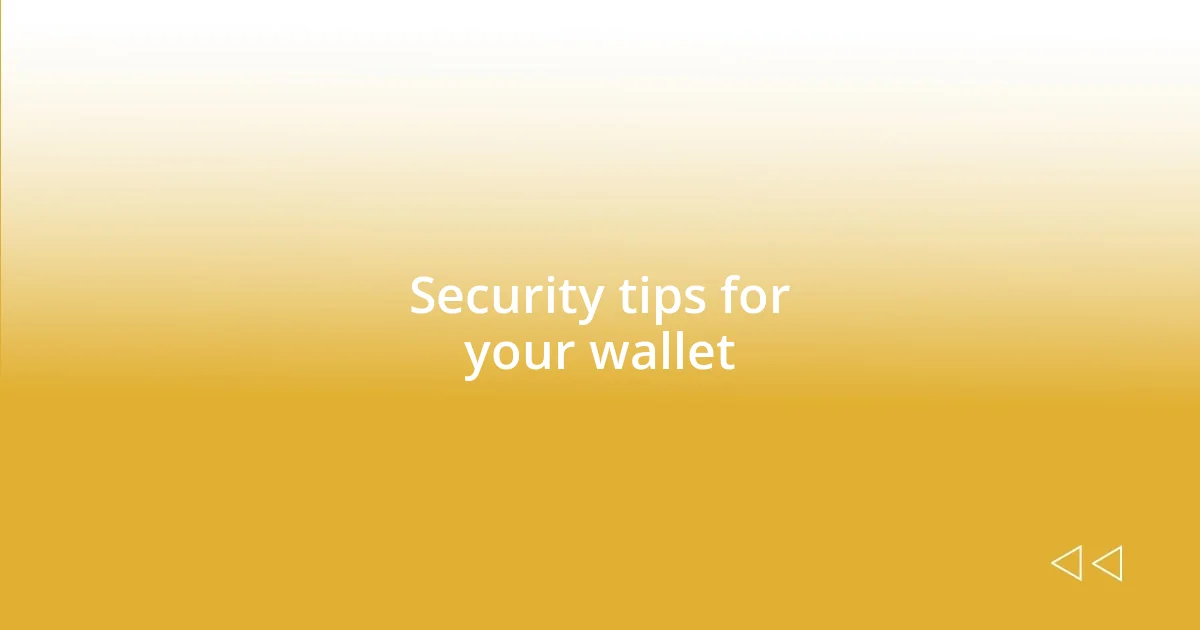
Security tips for your wallet
I always make it a point to safeguard my wallet from theft or loss. One strategy that works wonders for me is to compartmentalize my cards by importance. I keep essential cards, like my ID and primary debit card, in a designated spot that’s quick to access. This way, if I’m ever in a rush or feeling flustered, I don’t accidentally pull out something less critical. Have you ever scrambled through your wallet when a cashier is waiting? It’s the kind of situation that can elevate your stress levels.
I also use RFID-blocking wallets to protect against electronic pickpocketing. I was skeptical at first, wondering if they genuinely offered any advantages over traditional wallets. After reading up on RFID technology, which enables thieves to scan your card information without ever touching your wallet, I decided to make the switch. Now, I feel a sense of relief knowing that my personal details aren’t so easily accessible to potential fraudsters. Have you taken any steps to shield your personal information lately?
Another tip that I’ve found to be effective is to regularly review my wallet contents, both digital and physical. This small ritual not only keeps my wallet organized but also ensures I identify and cancel any unused cards or subscriptions. Once, I discovered an old gym membership card that I had totally forgotten about—a waste of money I could have otherwise put towards something meaningful. How often do you check your own wallet for useful information? It’s a simple practice that can save you money and stress in the long run.
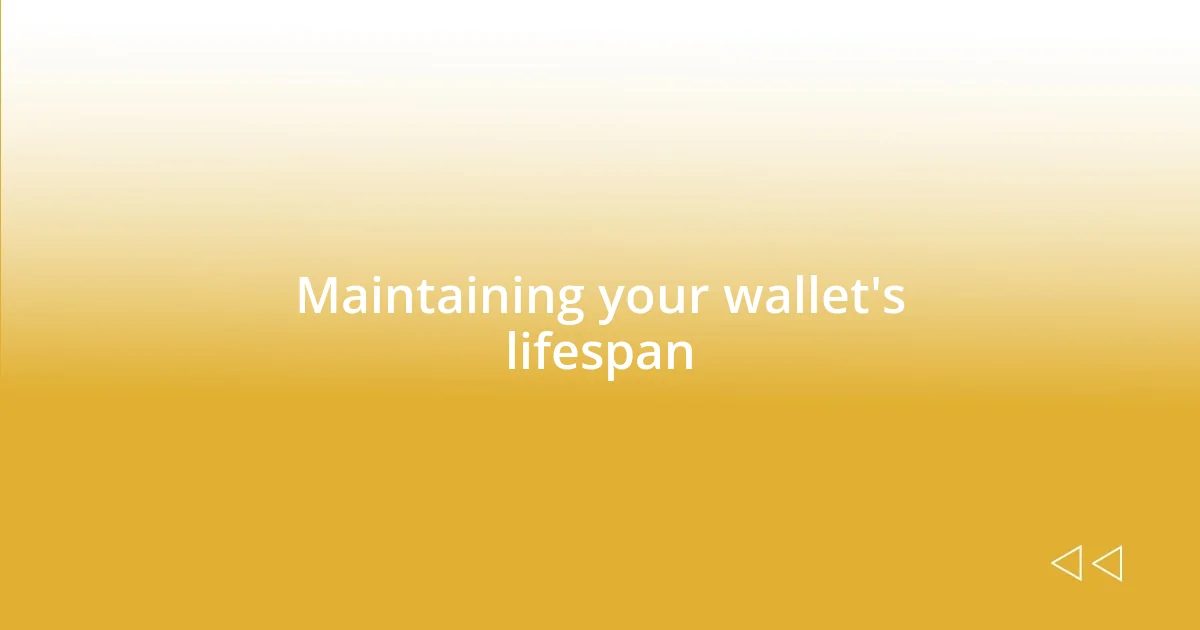
Maintaining your wallet’s lifespan
Maintaining my wallet’s lifespan really comes down to a few mindful practices. I’ve learned the hard way that overloading it with too many cards not only makes it bulky but can also damage the stitching and material. I tend to keep only what I need—maybe a couple of credit cards, my ID, and a few essentials. Have you ever tried minimalist packing in your wallet? I find that it feels liberating.
Cleaning out my wallet semi-regularly is another way I extend its life. I remember a time when I let receipts pile up, creating a cluttered mess that wore on the wallet’s interior. Now, I make it a habit to clear out unwanted receipts and old cards each month. It feels therapeutic to have a tidy wallet, and it’s surprising how much space it creates. When was the last time you gave your wallet a good spring cleaning?
Finally, I consider the environment in which I store my wallet. I’ve noticed that exposure to extreme temperatures, like leaving it in a hot car, can dry out the leather, leading to cracks. I make a conscious effort to keep it in a cool, dry place when I’m not using it. It’s funny how such simple things can make a big difference, don’t you think? Taking care of my wallet is just like taking care of any valuable possession; it requires a little attention to thrive.









